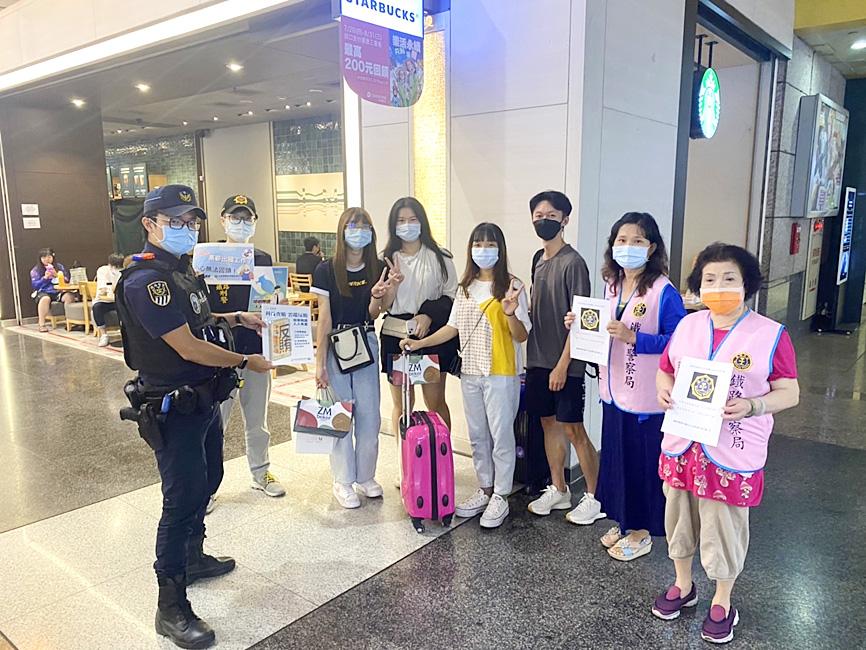One of the nation’s leading online job banks has removed more than 100 overseas job openings posted on its Web site because of concerns over human traffickers’ attempts to lure Taiwanese to Cambodia through the promise of high-paying jobs.
104 Job Bank yesterday said it has removed 179 job postings in “high-risk countries or areas,” including Cambodia, the Philippines, Myanmar, Laos and Thailand, that have been provided by 37 companies.
Other countries considered to be high risk include the United Arab Emirates, Kenya, Turkey and Uganda, the company said.

Photo copied by Wang Kuan-jen
They were removed as a result of the company’s tightening of standards for listings for overseas jobs advertised by companies based in Taiwan and those operating overseas, it said.
Taiwan-based firms must now be publicly listed and have had their investment in the overseas company formally approved by the Investment Commission to be able to list job openings overseas, the 104 Job Bank said.
At the same time, companies operating in high-risk countries will not be allowed to post job openings on the 104 Job Bank Web site unless they are well-known publicly listed enterprises, it said.
Commenting on the recent overseas job scam threat, the agency cautioned people against entertaining job offers that seem too good to be true, and it said it would cooperate with police and continue to look for suspicious job openings posted on its platform.
The National Police Agency said that many Taiwanese have fallen prey to human traffickers to take nonexistent jobs in Cambodia and have been abused after arriving there.
A task force was set up by the government on Thursday last week to help victims still trapped there.

A group of Taiwanese-American and Tibetan-American students at Harvard University on Saturday disrupted Chinese Ambassador to the US Xie Feng’s (謝鋒) speech at the school, accusing him of being responsible for numerous human rights violations. Four students — two Taiwanese Americans and two from Tibet — held up banners inside a conference hall where Xie was delivering a speech at the opening ceremony of the Harvard Kennedy School China Conference 2024. In a video clip provided by the Coalition of Students Resisting the CCP (Chinese Communist Party), Taiwanese-American Cosette Wu (吳亭樺) and Tibetan-American Tsering Yangchen are seen holding banners that together read:

UNAWARE: Many people sit for long hours every day and eat unhealthy foods, putting them at greater risk of developing one of the ‘three highs,’ an expert said More than 30 percent of adults aged 40 or older who underwent a government-funded health exam were unaware they had at least one of the “three highs” — high blood pressure, high blood lipids or high blood sugar, the Health Promotion Administration (HPA) said yesterday. Among adults aged 40 or older who said they did not have any of the “three highs” before taking the health exam, more than 30 percent were found to have at least one of them, Adult Preventive Health Examination Service data from 2022 showed. People with long-term medical conditions such as hypertension or diabetes usually do not

POLICE INVESTIGATING: A man said he quit his job as a nurse at Taipei Tzu Chi Hospital as he had been ‘disgusted’ by the behavior of his colleagues A man yesterday morning wrote online that he had witnessed nurses taking photographs and touching anesthetized patients inappropriately in Taipei Tzu Chi Hospital’s operating theaters. The man surnamed Huang (黃) wrote on the Professional Technology Temple bulletin board that during his six-month stint as a nurse at the hospital, he had seen nurses taking pictures of patients, including of their private parts, after they were anesthetized. Some nurses had also touched patients inappropriately and children were among those photographed, he said. Huang said this “disgusted” him “so much” that “he felt the need to reveal these unethical acts in the operating theater

Heat advisories were in effect for nine administrative regions yesterday afternoon as warm southwesterly winds pushed temperatures above 38°C in parts of southern Taiwan, the Central Weather Administration (CWA) said. As of 3:30pm yesterday, Tainan’s Yujing District (玉井) had recorded the day’s highest temperature of 39.7°C, though the measurement will not be included in Taiwan’s official heat records since Yujing is an automatic rather than manually operated weather station, the CWA said. Highs recorded in other areas were 38.7°C in Kaohsiung’s Neimen District (內門), 38.2°C in Chiayi City and 38.1°C in Pingtung’s Sandimen Township (三地門), CWA data showed. The spell of scorching